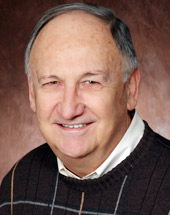Mike MacCracken, PhD

Michael MacCracken has been Chief Scientist for Climate Change Programs with the Climate Institute in Washington DC since 2002; he was also elected to its Board of Directors in 2006. Both of these positions are held on a volunteer basis.
Dr. MacCracken received his B.S. in Engineering degree from Princeton University in 1964 and, with the support of a Hertz Foundation fellowship, his Ph.D. degree in Applied Science from the University of California Davis/Livermore in 1968. His dissertation used a 2-D climate model to evaluate the plausibility of several hypotheses of the causes of ice ages. Following his graduate work, he joined the Physics Department of the University of California’s Lawrence Livermore National Laboratory (LLNL) as an atmospheric physicist. His research in the ensuing 25 years included numerical modeling of various causes of climate change (including study of the potential climatic effects of greenhouse gases, volcanic aerosols, land-cover change, and nuclear war) and of factors affecting air quality (including photochemical pollution in the San Francisco Bay Area and sulfate air pollution in the northeastern United States). At LLNL, he also served as division leader for atmospheric and geophysical sciences from 1987-1993 and as deputy division leader from 1974-1987.
From 1993-2002, Dr. MacCracken was on assignment as senior global change scientist to the interagency Office of the U.S. Global Change Research Program (USGCRP) in Washington D.C., also serving as its first executive director from 1993-1997. From 1997-2001, he served as executive director of the USGCRP’s National Assessment Coordination Office, which coordinated the efforts of 20 regional assessment teams, 5 sectoral teams, and the National Assessment Synthesis Team (which was constituted as a federal advisory committee) that prepared the national climate impacts assessment report that was forwarded to the President and on to the Congress in late 2000. During this period with the Office of the USGCRP, Dr. MacCracken also coordinated the official U.S. Government reviews of several of the assessment reports prepared by the Intergovernmental Panel on Climate Change (IPCC), and he was a co-author/contributing author for various chapters in the IPCC assessment reports.
When Dr. MacCracken’s assignment with the Office of the USGCRP concluded on September 30, 2002, he simultaneously retired from LLNL. In addition to his activities with the Climate Institute, he served on the integration team for the Arctic Climate Impact Assessment from 2002-04 and as president of the International Association of Meteorology and Atmospheric Sciences (IAMAS) from 2003-07. As president of IAMAS, Dr. MacCracken also served on the executive committee of International Union of Geodesy and Geophysics (IUGG) from 2003-07 and the executive committee of the international Scientific Committee for Oceanic Research (SCOR) from 2003-11. From 2004-05, he served on a panel of the Scientific Committee on Problems in the Environment that prepared a report on what is known about the likelihood and consequences of an asteroid or comet impact, and from 2004-07 on a scientific expert group convened by Sigma Xi and the UN Foundation at the request of the UN’s Commission on Sustainable Development to suggest the best measures for mitigating and adapting to global climate change.
Dr. MacCracken is a fellow of the American Association for the Advancement of Science, American Meteorological Society, and IUGG and also as a long-term member of the Oceanography Society and the American Geophysical Union. His legal declaration relating global climate change to the impacts on particular regions was cited favorably by Justice Stevens in his majority opinion in the landmark 2007 decision in Massachusetts et al. versus EPA.
Graduate Studies
Undergraduate Studies
Awards
1997, Fellow, American Association for the Advancement of Science